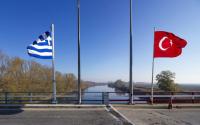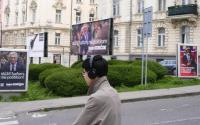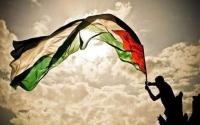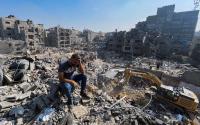The By-product Victims of the Holocaust: From Deir Yassin to Jenin by Omar Barghouti April 11, 2002
Ramallah: "Between ourselves it must be clear that there is no room for both peoples together in this country … . We shall not achieve our goal of being an independent people with the Arabs in this small country. The only solution is a Palestine, at least Western Palestine [west of the Jordan River] without Arabs … . And there is no other way than to transfer the Arabs from here to the neighbouring countries, to transfer all of them; not one village, not one tribe, should be left … . Only after this transfer will the country be able to absorb the millions of our own brethren. There is no other way out."1 This is not one of the many infamous statements by the deceased Rehavam Ze’evi or Meir Kahane, it is a 1940 declaration by Yosef Weitz, one of the Zionist officers responsible for Jewish colonization and member of the Jewish Agency’s first "Transfer Committee." Fifty four years later, an Israeli soldier, participating in the army’s brutalities in Jenin refugee camp, told the Guardian: "The problem is that there is not enough room in this small country for two peoples. It is a trial of strength that we are winning. They would like to throw us into the sea. We may have to do the same to them."2 The irony is that virtually all those refugees in the Jenin camp were first "transferred" from the coastal region of Haifa in 1948, to make room for the influx of Jewish victims of the Holocaust. And now, they are facing death, destruction and possibly another forced displacement. The victims of the Holocaust are victimizing the byproduct victims of the Holocaust yet another time.This April 9th, Palestinians everywhere commemorated the 54th anniversary of the Deir Yassin massacre, when Zionist terror groups murdered 254 innocent Palestinian Arabs in cold blood, as documented by several historians, including some of the "new historians" in Israel. In an authoritative account of the massacre, the British interrogating officer then, Assistant Inspector-General Richard Catling, confirmed that: "Many young school girls were raped and later slaughtered … Many infants were also butchered and killed."3 Deir Yassin was meant to set an example, a particularly shocking precedent, to terrorize the Palestinians off their lands and into exile. It was no accident, no aberration, no extreme vengeance, simply a calculated act of terror in a well-thought-out plan to depopulate Palestine, and create in the resulting space a Jewish homeland for the victims of the Nazi genocide. Those victims also observed "Holocaust Day" this April 9th.This coincidence stirs up a bitter irony: the victims of one of history’s worst crimes against humanity are increasingly resorting to some of the same tools of racist hatred and collective punishment to complete the job that the founders of Zionism had envisioned: a "pure" Jewish state. Last month, during a visit by a delegation from the International Parliament of Writers, the famous Portuguese Nobel Prize winner, Jose Saramago, dreaded the "spirit of Auschwitz" in Ramallah and the rest of the occupied Palestinian territories. Many Israeli intellectuals hypocritically condemned the remark, some implicitly accusing Saramago of anti-Semitism. Ironically, just this past January, Ha’aretz reported that "one of the Israeli officers in the [occupied] territories" found it justified to "internalize the lessons of earlier battles even, however shocking it may sound, even how the German army fought in the Warsaw ghetto."4 Indeed, several Israeli policies have evoked analogies with the Nazis, despite the unquestionable disparity in the magnitude of criminality between the two cases. Some of the wicked practices of the Nazis in concentration camps were even imported unabashedly by Israeli army officers. During the last army incursion into Palestinian towns and refugee camps towards the end of February of this year, the Washington Post reported: "The [Israeli] army’s mass roundups of Palestinian refugees has been a public relations disaster for Israel, as images have been broadcast and printed around the world of blindfolded captives including teenage boys and graying middle-aged-men held at gunpoint. Some Israelis were also incensed that [Israeli] troops were writing [identification] numbers on some of the prisoners’ arms and foreheads …."5 One of those who expressed "outrage" over this practice was the right-wing Israeli lawmaker, Tommy Lapid, who declared in the Knesset, "As a refugee from the Holocaust I find such an act insufferable."6In the current Israeli offensive against the Palestinians under its occupation, implementing Sharon’s promise to "batter them into submission," the Israeli army has systematically committed several serious violations of international humanitarian law and the Fourth Geneva Convention which amounted to war crimes, as described by UN agencies, Israeli human rights organizations and by Israel’s best friend in the region, the Turkish Prime Minister, Bulent Ecevit7. Some of the better documented examples included the "shaving" 8 of dwellings on top of their occupants in the Jenin refugee camp, indiscriminately shelling that crowded camp’s humble homes from tanks and helicopters, unabatedly, for seven days, "using the elderly as human shields" in front of the tanks9, and persistently preventing ambulances from reaching the injured, and even shooting at several ambulances which dared to try -- as documented by the International Committee of the Red Cross (ICRC).10 Hundreds of innocent civilians, including scores of children, were confirmed killed or injured as a result of the army’s arbitrary clearing of the homes and the tiny alleys to allow its tanks to advance into the Jenin camp. The Times of London carried an eyewitness account of a survivor of the carnage there, who confirmed that "Children screamed for water, some were forced to drink sewage." He also said that, "the most terrible thing was seeing Israeli soldiers take eight men and line them up and kill them."11 Those eight names were later aired on Al-Jazeera TV on April 10th, 2002, by a Palestinian source. The commander of the Israeli forces in Jenin justified the tragic civilian loss and suffering saying, "But people who raise children willing to commit suicide … who choose this path, they are expected to pay the price."12 To top it all off, the fresh newcomer to the already extremist Israeli government will be no other than Brigadier General (res.) Effi Eitam, currently the head of the National Religious Party, who thinks of the Arab citizens of Israel in the following terms:"[T]he Israeli Arabs are in large measure the ticking bomb beneath the whole democratic Israeli order inside the [1967] Green Line. Even today, in the Galilee and the Negev, a de facto autonomy of theirs is being created, which could in practice turn Israel into the bubble of Metropolitan Tel Aviv .… Therefore, I say that the State of Israel today faces an existential threat that is characterized by being an elusive threat, and elusive threats by their nature resemble cancer. Cancer is a type of illness in which most of the people who die from it die because they were diagnosed too late. By the time you grasp the size of the threat, it is already too late to deal with it."13 Commenting on this, the veteran Israeli journalist, Akiva Eldar, wrote in Ha’aretz, "The fact that the Nazis were especially fond of this [cancer] metaphor is probably not lost on the general."14This clear trend towards the extreme right in Israel hardly provokes any popular challenge, thanks mainly to the unprecedented complicity of the Israeli media. Although most of the media in Israel have never boasted a very bright record in being critical of government policies towards the Palestinians, they have sunk to new lows of collusion in covering or covering up, rather the current Israeli "campaign of terror," as The Guardian termed it. 15 "A journey through the [Israeli] TV and radio channels and the pages of the newspapers," writes Aviv Lavie in Ha’aretz, "exposes a huge and embarrassing gap between what is reported to [Israelis] and what is seen, heard, and read in the world not only in the commentaries and analytical pieces, but also in the reporting of the dry facts." He adds, "Israel looks like an isolated media island, with most of the reporters drafted into the cause of convincing themselves and the reader that the government and army are perfectly justified in whatever they do."16This fact, coupled with the enthusiastic approval, or dubious silence, of the absolute majority of Israeli Jews, renders the fear of creeping fascism in Israeli society as expressed by several Israeli Knesset members a bit optimistic: fascism is already there. Several Israeli commentators and politicians have recently warned that unless the Palestinians accept the fact that they cannot gain anything through the use of force, they might witness an encore of the Nakba [the 1948 Palestinian catastrophe]. Given the prevailing attitudes and convictions among Israelis, and the alarming level of impunity, which Israel takes for granted, one cannot take this threat lightly. Sources:1. Salman Abu Sitta, Palestinian Right to Return: Sacred, Legal and Possible, P.28. (London, The Palestinian Return Centre, 1999), p. 28.2. Peter Beaumont, _‘We’re terrified but what can I do against this?’, The Guardian, April 8, 2002.3. Salman Abu Sitta, P. 28.4. Amir Oren, At the gates of Yassergrad, Ha’aretz, January 25, 2002.5. Lee Hockstader, Massive Israeli Force Enters Ramallah, Washington Post, March 13, 2002.6. Steve Weizman, Israel Criticized for I.D. Numbers, Associated Press, March 12, 2002.7. Douglas Frantz, With a Word, Israeli-Turkish Strain Surfaces, The New York Times, April 10, 2002.8. Aluf Benn and Amos Harel, Peres calls IDP operation in Jenin a _‘massacre’, Ha’aretz (updates), April 9, 2002.9. Justin Huggler and Said Ghazali, Witnesses tell how elderly wre used as human shields for tank forces, The Independent, 9 April 2002.10. ICRC Press Release, 5 April, 2002.11. Janine Di Giovanni, Children scream for water in the _‘City of Bombers’, The Times Online, April 9, 2002.12. Ha’aretz Staff, IDF: Palestinians in Jenin well prepared for fighting, Ha’aretz, April 6, 2002.13. Ari Shavit, Dear God, this is Effi, Ha’aretz, March 24, 200214. Akiva Eldar, A Nazi by any other name, Ha’aretz, April 4, 2002.15. Time to get serious, Leader, The Guardian, April 9, 2002.16. Aviv Lavie, The war looks different abroad and maybe so do the facts, Ha’aretz, April 2, 2002.






